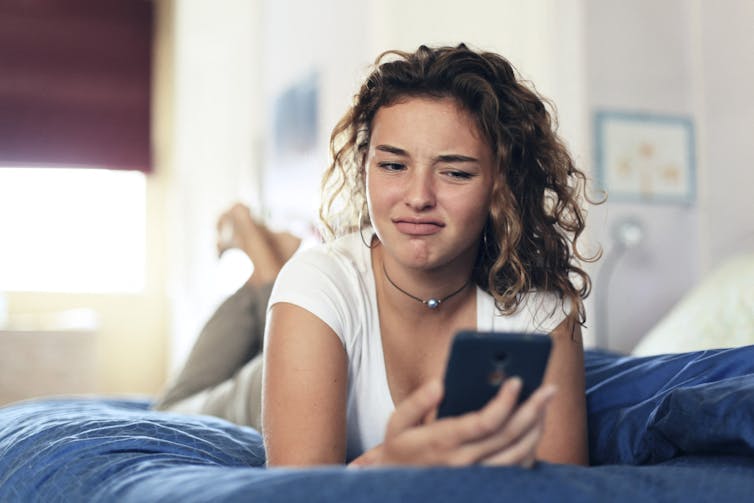
By Anne Oeldorf-Hirsch
Last time you scrolled the “For You” page on TikTok, did you get a video about current events? Politics? Breaking news?
If you’re one of the 63% of teens or 33% of adults in the U.S. who uses TikTok, you probably have. But where did it come from? Who created it? And should you believe what it told you?
As a communication researcher who has studied news content on social media for over a decade, I can share three crucial things to know about news you get on TikTok: What videos count as news, how they got to you, and what you should do when you see them.
These are three of what media researchers know as the “5 C’s” of news literacy: content, circulation and consumption. While they can be applied to any kind of news use, they are especially important for TikTok, where anyone can create content, and the algorithm decides what we see.
First C: Content
TikTok is full of user-generated content – content that is created by other users on the app rather than official news organizations – so it’s important to think about what is in your feed. This means knowing what is actually news and what is something else, like opinion or advertising.
Any user can post their opinion, whether or not it’s backed up by any proof. TikTok has some rules about what cannot be posted, such as content that is considered inappropriate for minors or harmful content like harassment or hate speech. Still, anyone can post their own ideas about anything, including current events. This means that just because a video is on the app doesn’t make it true.
TikTok has become a major player in advertising, with ad revenues in the U.S. alone expected to reach over US$13 billion in 2026. TikTok does its best to make videos that have been boosted with paid advertising look like any other content. You may have seen videos that seem like “real” content – uncompensated thoughts from an individual user – only to discover that they’re part of a paid brand partnership.
However, the platform does have rules about ads and gives some clues for identifying paid posts. Look for a “sponsored” or “ad” label near the video’s caption or username. Another thing to look for is what’s called a “call-to-action” in the caption, like “tap the link to learn more!”
TikTok doesn’t have specific rules for sharing news, and it doesn’t separate news from other categories of information, like opinion, comedy or video blogs. Journalists at reputable news outlets, on the other hand, must follow certain standards.
For one, journalists will vet and cite their sources. That means they will share who they interviewed or what expert gave them their information, and that they’ve done research to make sure it’s a trustworthy source in the first place. They and their publication’s editors will also verify or fact-check content to make sure it’s true. So a video that shares news content should state where the information is from and link to that source.
Second C: Circulation
If you didn’t search for a TikTok video, it probably found you. By now, regular social media users know that TikTok has an algorithm that decides what content to show them. Algorithms are equations that learn what you like and decide how to recommend more of the same content to you.
On TikTok, you can click on “Share” and then “Why this video” to learn more about why a video was recommended for you. Usually, it’s because you’ve watched, liked or commented on similar content, searched for related topics or followed similar accounts. Recommendations also include videos that were posted recently near you and topics that are popular where you live.
The most important thing to remember is that each TikTok user is getting their own customized feed of content based on their behavior. Unlike in the past, when more of our news came from mainstream media – such as reading the same city newspaper or watching the same local news – now we may not know what news someone else is getting. If you see a lot of content about the same topic, that’s likely because of the algorithm customizing your feed, not necessarily because it’s the most important topic in the news.

Philippe TURPIN/Photononstop via Getty Images
Third C: Consumption
You probably know about “fake news” – what researchers usually call misinformation – and that there is a lot of it online. Social media apps know it too, and have tried different ways to keep it from spreading, like using fact-checkers to flag problematic content.
However, my team’s own research shows that these fact-checking programs may not be very successful. Some apps, like Facebook and Instagram, are even stopping fact-checking programs altogether. While TikTok doesn’t allow disinformation campaigns that are intended to deceive people, the app doesn’t prohibit people from sharing information that is simply inaccurate.
That means, beyond the clues you already read about above, you will need to develop your own skills in judging what’s real on TikTok.
First, think about your own opinions and biases. We all have them! Even news organizations can have biases, meaning some of them tend to report news from a certain political viewpoint.
The more you engage with content you already agree with, the more you will get of it, and the stronger your opinions can become about it. Instead, think about what other viewpoints exist and search for content from their side. One way to do this is to seek out content from reputable news organizations across the political spectrum.
Second, pay attention to where you get information. Is all your news coming from social media? Research shows that Americans who rely on social media as their main source of news are less knowledgeable than those who get news from almost any other news source. In a 2020 study, they couldn’t answer as many questions about current events like Donald Trump’s impeachment and the COVID-19 pandemic, for example, and were more likely to come across conspiracy theories. Pick a news website or two and sign up for their alerts instead.
Finally, continue to evaluate the content on your “For You” page. You don’t need to stop using TikTok, but do keep looking for those clues about whether information is credible: Who is it from? Is it a journalist, a news organization? Or maybe it was a news influencer, someone who has a large following on social media for sharing current events but who is not necessarily a journalist. Do they cite and link to sources?
If you can’t find this information, you should search about the topic online. If you don’t find any reputable news organizations reporting on it, you may want to think again about trusting it and sharing it.
![]()
Anne Oeldorf-Hirsch is Associate Professor of Communication Technology at the University of Connecticut.





























Ed P says
Duhhhh! And yet 52 % of TikTok users report they regularly get news on the platform. TikTok boasts 1.58 billion monthly users worldwide would suggest about 750, 000,000 people consume some news from TikTok.
In the US 170 million use TikTok, hence 80 million to 85 million Americans get news from TikTok.
Skibum says
Anyone who would believe TikTok has actual, legitimate news might also believe consuming Tic Tacs will cure cancer.